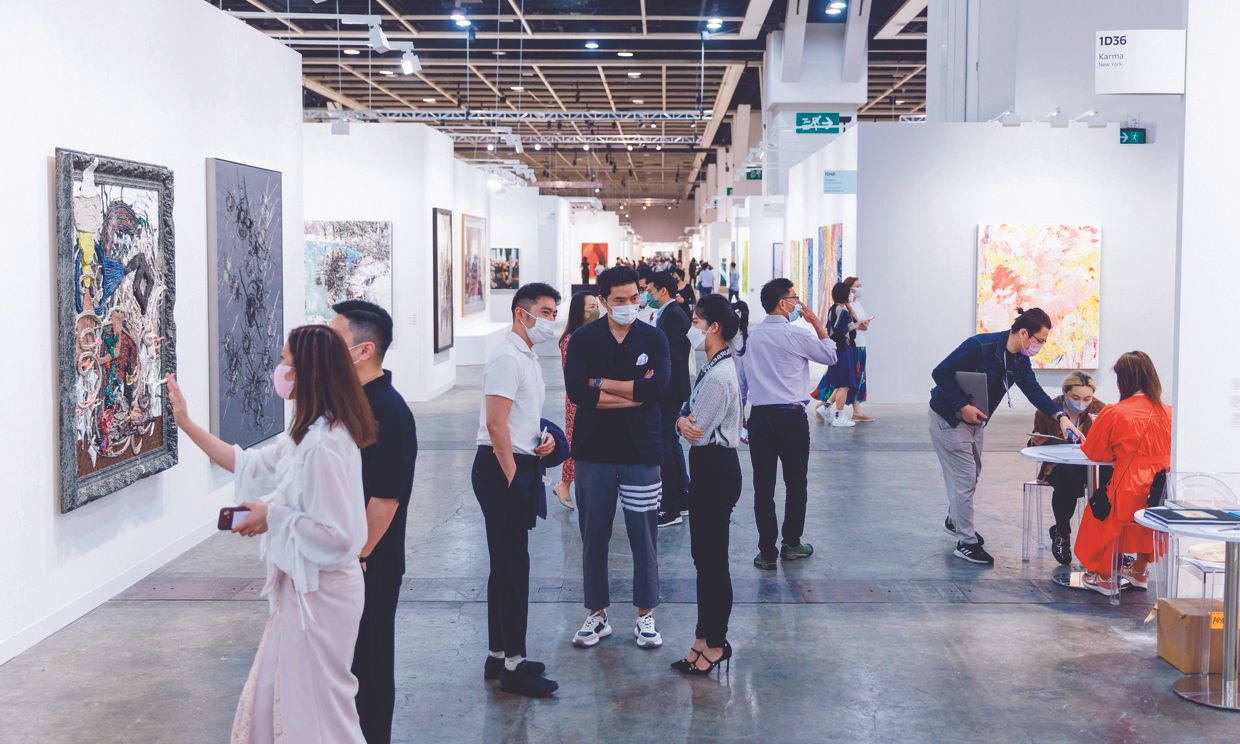Last year’s edition of Art Basel in Hong Kong was a muted event due to tough Covid quarantine measures
Courtesy of Art Basel
After three long years of zero Covid policies, Hong Kong’s art season roars back into action, led by a healthy Art Basel in Hong Kong (ABHK) line-up of 177 galleries—a 27% decrease in exhibitor numbers from its last regular edition in 2019—as well as an ambitious slate of gallery, museum and auction events. “The city is collectively pulling out all the stops for Hong Kong Arts Month,” says the fair’s new director Angelle Siyang-Le, as well as to welcome back international visitors.
Whether the international art world will indeed flock back this year is “impossible to predict”, Siyang-Le says, but she has “witnessed a surge in interest” after most Covid restrictions lifted in the city starting from December. Pandemic travel and quarantine policies, rather than other political interference from mainland China, have been the main challenge of recent years, she adds. “We haven’t encountered any censorship issues in the past and there also hasn’t been any form of interference in planning our show this year.”
Of this year’s participating galleries, two thirds have spaces in Asia and 33 in Hong Kong; the 22 newcomers include Shanghai’s Gallery Vacancy and Seoul’s Whistle galleries. The Encounters section returns with 13 large installation works by artists including Gimhongsok and Jaffa Lam. In 2022 and 2021, when entrance to the city required long hotel quarantines, participant numbers dropped respectively to 137 and 104, down from 242 in 2019.
Having previously headed Art Basel’s Asia gallery relations and greater China development before this year taking over fair directorship, Siyang-Le cites the peak Covid editions as “testament to the strength and resilience of the local market”, heavily driving global art trade growth along with mainland China. Many major market players have increased business in Hong Kong during this period, including Phillips auction house, which is due to launch a 50,000 sq. ft new headquarters in the West Kowloon Cultural District on 18 March.
Unrivalled position
In recent years, Art Basel’s parent company MCH has invested in a number of other East Asian ventures, such as Art SG Singapore fair and Tokyo Art Week, causing speculation that the company might be pulling out of Hong Kong. Siyang-Le, unsurprisingly, disagrees, maintaining that Hong Kong’s position as East Asia’s premier market hub has been dented by travel restrictions, not by a proliferation of art events in other Asian cities. She adds that Art Basel’s support for the Singapore and Tokyo events has helped to draw broader regional participation to ABHK. “Hong Kong has an unrivalled position due to its geographic location at the heart of Asia, its place as a leading financial hub, its tax-free status, its vibrant cultural scene and a local audience with a keen and growing interest in the arts.”
Since ABHK’s launch in 2013, she says, “the art scene has grown exponentially—from the opening of new museums such as M+ to a vibrant mixture of commercial and non-profit galleries and artist-run spaces. Our show has not only established itself as the leading platform for Modern and contemporary art in the region, it’s also deeply embedded in the cultural fabric of a city whose art scene continues to go from strength to strength.”
ABHK this year will show a commission by Pipilotti Rist on the M+ facade, one of a series of collaborations with local institutions such as Para Site and Asia Art Archive. It also brings special screenings from Hong Kong’s Videotage and Thailand’s Ghost 2565 non-profits that focus on video art. Along with major exhibitions including Asia’s largest LGBTQ+ art survey at Tai Kwun Contemporary, some 50 independent art events have been organised around the city during fair week. Integration with Hong Kong’s broader art scene has always been important to ABHK, says Siyang-Le, “but the pandemic really fostered a renewed sense of collegiality and solidarity. There is a strong community spirit in Hong Kong, and having to rely on each other over the past three years really brought us closer.”

